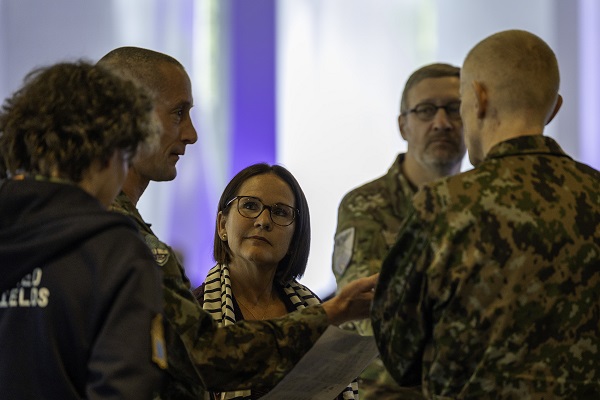 Yuriko Backes, Luxembourg's Minister of Defence, and General Steve Thull, Chief of Defence;
Credit: Luxembourg Army
Yuriko Backes, Luxembourg's Minister of Defence, and General Steve Thull, Chief of Defence;
Credit: Luxembourg Army
The Luxembourg Army has reported that cybersecurity specialists from the Grand Duchy recently took part in this year's Locked Shields cyber defence exercise.
Locked Shields is the world's largest annual cyber defence exercise. Organised since 2010 by NATO's Cooperative Cyber Defence Centre of Excellence (CCDCOE) in Tallinn, Estonia, the exercise allows different nations and their armed forces to test and train their national chain of command and cybersecurity experts to improve their skills in defending national IT systems and critical infrastructure against real-time attacks.
The 2024 edition took place during the week of 22 April, with cybersecurity experts from Luxembourg and Belgium forming a joint team. According to the Luxembourg Army, participation in this exercise offers a "perfect opportunity" for the Luxembourg Defence to demonstrate the country's desire to be part of the leading group of digital nations and to perfect the know-how of Luxembourg's cybersecurity specialists.
Luxembourg's Minister of Defence, Yuriko Backes, and General Steve Thull, Chief of Defence, attended a briefing during the VIP day on Thursday 25 April 2024, during which they had the opportunity to speak with the Belgian-Luxembourg team members.
"The ambition of Luxembourg Defence in the cyber domain is to have one of the most cyber-secure defences in NATO and the EU, in particular by placing emphasis on improving the skills of our staff. 'Locked Shields' allows us to train our cyber experts, from the public and private sector, in a realistic scenario. Our participation in this exercise, together with our Belgian partner, allows us to strengthen the resilience of national cyberspace," stated Minister Backes.
The focus of this annual exercise is on realistic scenarios, cutting-edge technologies and the simulation of the full complexity of a large-scale cyber incident, including political decision-making, legal aspects and communication.
This is a "Red Team" versus "Blue Team" exercise. The Blue Teams, formed by CCDCOE member nations, take on the role of national cyber rapid reaction teams who are deployed to assist a fictional country in managing a large-scale cyber incident.
The Belgian-Luxembourg team in 2024 was made up of more than 130 participants, including more than 80 Luxembourg participants from various administrations and organisations, namely: Luxembourg House of Cybersecurity; University of Luxembourg; Grand Ducal Police; Customs and Excise Agency; F3C Systems; POST Luxembourg; Digisquad; municipal administration of the City of Esch-sur-Alzette; Banque Centrale du Luxembourg (BCL); Centre Hospitalier Emile Mayrisch (CHEM); CFL; Chamber of Deputies (parliament); Commission de Surveillance du Secteur Financier (CSSF); La Provençale; LU-CIX; Luxair; Ministry of the Economy; Proximus; SEBES; SES; SITS; RawSec; WSA; SUDenergie; Kyndryl; Directorate of Defence; Luxembourg Army.










